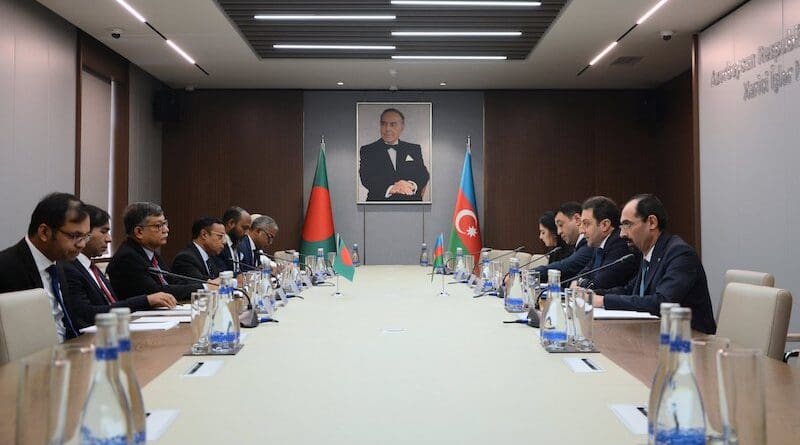Strengthening Bilateral Ties: Bangladesh’s Strategic Engagement With Azerbaijan For Energy And Climate Collaboration – Analysis
On June 14, 2024, Foreign Secretary (Senior Secretary) Ambassador Masud Bin Momen of Bangladesh embarked on a pivotal diplomatic mission to Baku, Azerbaijan. During his visit, he paid a courtesy call on Mr. Elnur Sultanov, Deputy Minister of Energy of Azerbaijan and CEO of COP 29 (Conference of the Parties to the UN Framework Convention on Climate Change). This meeting underscored the burgeoning relationship between Bangladesh and Azerbaijan, particularly focusing on energy cooperation and climate change mitigation strategies. The discussions led to a mutual agreement on potential natural gas imports and reinforced commitments to address global climate challenges collaboratively.
Bangladesh’s Quest for Energy Security
Bangladesh, a rapidly developing nation, faces significant energy demad. With a burgeoning population and expanding industrial base, the demand for energy has been increasing exponentially. Natural gas, which currently accounts for a substantial portion of the country’s energy mix, is a critical component of Bangladesh’s energy strategy. However, the overall demand is so high that it necessitates the exploration of new avenues for energy importation.
In this context, Azerbaijan emerges as a promising partner. Known for its rich oil and natural gas reserves, Azerbaijan presents a viable solution to Bangladesh’s energy needs. According to the BP Statistical Review of World Energy in June 2021, Azerbaijan’s proven natural gas reserves stood at 2.5 trillion cubic meters. This significant resource base positions Azerbaijan as an attractive partner for countries seeking stable and long-term energy supplies.
Azerbaijan’s Energy Landscape
Azerbaijan’s energy sector is a cornerstone of its economy. The nation’s oil reserves, totaling 7 billion barrels at the end of 2020, account for 0.4% of global reserves. Offshore production in the Caspian Sea, particularly from the Azeri-Chirag-Deepwater Gunashli (ACG) field, is a major contributor to this output. The ACG field, discovered in the early 1970s, remains the largest oilfield in the Azerbaijan sector of the Caspian Basin, with production occurring at depths of 2,000 to 3,500 meters beneath the seabed.
Natural gas, though not as globally dominant as oil in Azerbaijan, is increasingly significant. The BP Statistical Review of World Energy 2021 highlights the strategic importance of these gas reserves, which are set to contribute substantially to Azerbaijan’s economy for decades.
The Proposal for an MoU
During the meeting, Ambassador Masud Bin Momen proposed the signing of a Memorandum of Understanding (MoU) to facilitate the import of natural gas from Azerbaijan to Bangladesh. This proposal received a positive response from Mr. Elnur Sultanov, indicating a strong willingness from the Azerbaijani side to explore this collaborative venture. The MoU is expected to pave the way for detailed negotiations, technical assessments, and the establishment of a framework for gas supply agreements.
Climate Change Collaboration: A Shared Responsibility
As the incoming chair of COP 29, Azerbaijan is poised to play a pivotal role in global climate governance. The country is committed to ensuring enhanced climate financing for developing nations and optimizing mechanisms developed in previous climate conferences, such as Nationally Determined Contributions (NDCs) and the Loss and Damage Fund. These initiatives are crucial for supporting vulnerable countries in their climate adaptation and mitigation efforts.
Bangladesh’s Climate Imperative
Bangladesh, one of the most climate-vulnerable countries in the world, has been at the forefront of advocating for robust climate action. The country’s low-lying geography makes it particularly susceptible to sea-level rise, cyclones, and other climate-related disasters. Therefore, adaptation measures are of paramount importance to Bangladesh, surpassing even the critical need for mitigation efforts.
During the meeting, Ambassador Masud Bin Momen emphasized Bangladesh’s focus on climate adaptation and proposed collaboration with Azerbaijan in this domain. He assured that Bangladesh is committed to working closely with Azerbaijan to enhance the efficacy of climate financing and adaptation mechanisms.
Potential Areas of Collaboration
The dialogue between Bangladesh and Azerbaijan highlighted several key areas for potential collaboration:
Joint Research and Development: Both countries can invest in joint research initiatives to develop climate-resilient technologies and practices, particularly in agriculture, water management, and disaster preparedness.
Capacity Building: Azerbaijan’s experience in energy management and Bangladesh’s expertise in climate adaptation can be synergized to build capacities in both nations. This can include training programs, knowledge exchange workshops, and collaborative projects.
Financial Mechanisms: Leveraging Azerbaijan’s role in COP 29, both countries can work together to advocate for more accessible and substantial climate financing from international bodies. This includes enhancing the implementation of the Loss and Damage Fund and ensuring it effectively reaches the most vulnerable communities.
Technological Exchange: Bangladesh can benefit from Azerbaijan’s advanced technological capabilities in energy production, while Azerbaijan can learn from Bangladesh’s innovative approaches to community-based climate adaptation.
Conclusion: A Strategic Partnership for the Future
The first round of Foreign Office Consultations (FOC) between Bangladesh and Azerbaijan, held on June 14, 2024, in Baku, marks a significant milestone in the bilateral relations between the two countries. The meeting underscored the strategic importance of energy cooperation and climate change collaboration, laying the groundwork for a robust partnership.
The proposed MoU on natural gas imports is a testament to the mutual benefits that such cooperation can yield. For Bangladesh, it promises a stable and reliable source of energy, crucial for sustaining its economic growth. For Azerbaijan, it opens up new markets and strengthens its role as a key energy supplier in the region.
On the climate front, the collaboration between Bangladesh and Azerbaijan holds the promise of more effective and equitable climate action. By working together, both countries can amplify their voices on the global stage, advocate for greater climate justice, and ensure that international mechanisms are responsive to the needs of developing nations.
As the world grapples with the twin challenges of energy security and climate change, the strategic partnership between Bangladesh and Azerbaijan serves as a model for how countries can collaborate to achieve common goals. This partnership not only addresses immediate needs but also contributes to long-term sustainability and resilience, benefiting not just the two nations involved but the global community as a whole.

